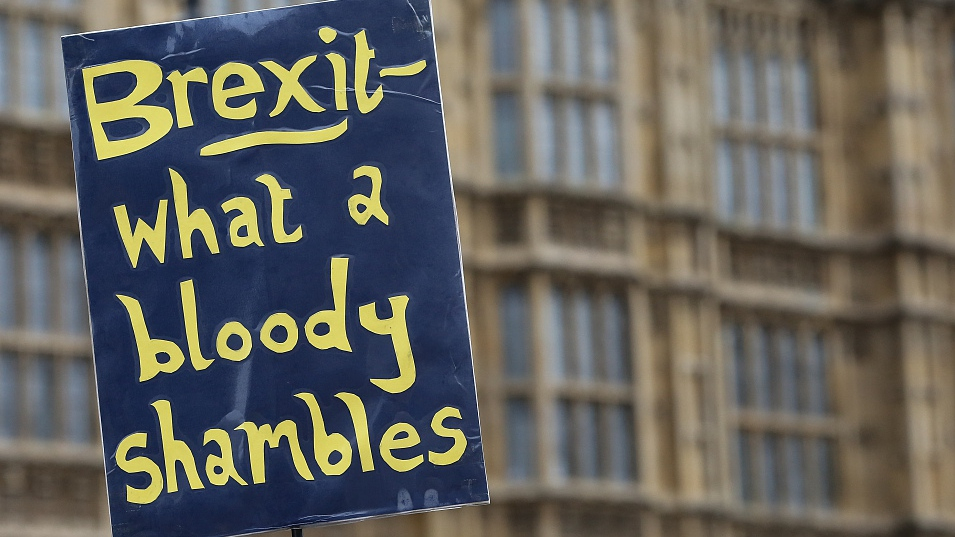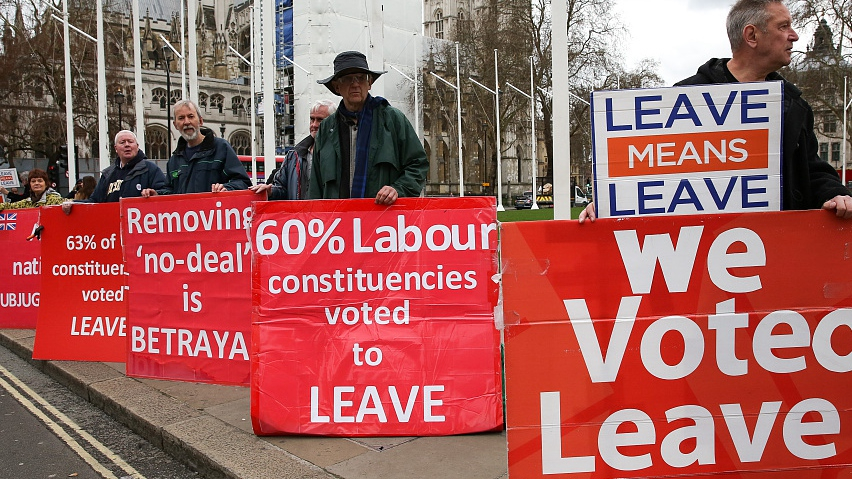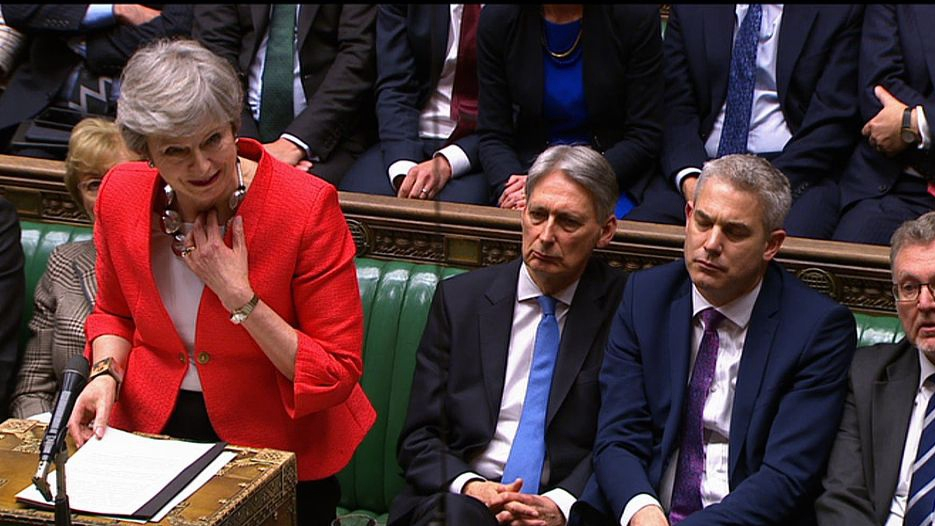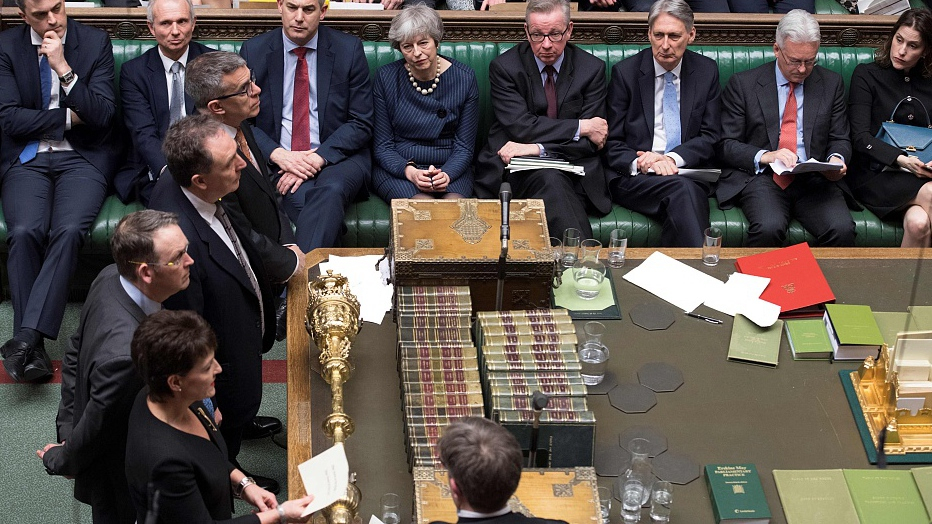
Opinion
16:45, 20-Mar-2019
A Brexit extension changes nothing
Updated
18:08, 20-Mar-2019
Tom Fowdy

Editor's note: Tom Fowdy, who graduated from Oxford University's China Studies Program and majored in politics at Durham University, writes about international relations focusing on China and the Democratic People's Republic of Korea. The article reflects the author's views, and not necessarily those of CGTN.
The upcoming European Union leader's summit on Thursday is set to be a significant event. British Prime Minister Theresa May will be attending with the view of asking for an extension of Article 50, effectively delaying Brexit.
Although May's deal has been defeated twice in Parliament and denied a third vote by the speaker, nevertheless the House of Commons was able to haggle together a consensus and pass two votes that a "no-deal" outcome should be avoided and concurrently, Article 50 should be therefore extended and Brexit delayed. How long exactly remains a matter of speculation. In attending the summit, the Prime Minister must successfully convince all 27 EU heads of state to agree to the delay, otherwise, Britain will leave Europe by default on March 29.

Pro-Brexit demonstrators are seen holding placards during the protest outside the Houses of Parliament. /VCG Photo
Pro-Brexit demonstrators are seen holding placards during the protest outside the Houses of Parliament. /VCG Photo
Even if European leaders endorse Theresa's proposals, there are still enormous unresolved problems at stake. The Prime Minister is asking for an extension without any kind of offering alternative arrangement or plan on how to move ahead from that point, insistent upon her own deal.
Similarly, leaders in Europe seem to be underestimating the divisiveness of the issue in the UK and in entrenching their own positions, are trapping May in a corner. Given this, save there is a major change in the political status quo of the UK, a Brexit extension is doomed to result in a prolonged limbo of the status quo, favorable to nobody.
Theresa May is beating a dead horse with a stick. The deal she negotiated with Brussels has been defeated twice overwhelmingly in Parliament. In no case was this a surprise; in fact, it was something that seemed obvious from the day it was announced last year. Feeling bound by what Europe offered, the Prime Minister has squandered all the political capital she had on attempting to salvage and force through an agreement which few wanted, even within her own party.
Now, with Brexit only technically days away, she has been left with no other choice but to prevent the worst from happening by default, that is the "no-deal" scenario. To do so, she has resigned to accept an extension to Article 50 and a delay of the process of leaving itself.
Fearful of the economic fallout, Parliament agreed to this routinely. MPs were happy to make a consensus that no deal should be ultimately avoided and Article 50 should be extended to prevent it.
However, to set it in stone, May now needs European approval on Thursday's summit where all 27 European Union leaders will gather. The norm of Inter-European diplomacy is that such meetings operate by consensus, seeking to establish a common position in a pragmatic way.

Britain's Prime Minister Theresa May speaking to the house after losing the second meaningful vote on the government's Brexit deal, in the House of Commons, March 12, 2019. /VCG Photo
Britain's Prime Minister Theresa May speaking to the house after losing the second meaningful vote on the government's Brexit deal, in the House of Commons, March 12, 2019. /VCG Photo
Thus for anything to pass, every single country must vote in favor of it. It is unheard of for a single state to block something in its entirety out of dissent, even if they continue to disagree with a measure.
Hence, Europe together established a common position on a deal for Britain to leave the bloc and stuck to it. This, of course, is Theresa May's deal - the only deal they were willing to offer, which is why she has been so persistent in keeping it.
But this is part of the problem. There seems to be a total incomprehension on the continent as to why the proposal keeps getting defeated in Westminster, or why for that matter it is so divisive.
The adversarial element of British politics is being underestimated, Britain operating much more on polarized confrontation than on consensus, as is the norm in many European countries. In doing so, it overestimates the country's national unity on Brexit and why some parties will simply not agree to the negotiated terms of exit.
Yet, it effectively corners Theresa May. It is a deal Europe has built a consensus on, but it is not a deal which Britain itself or Westminster has built a consensus on. It is a deal that has originated from a highly divisive and controversial referendum which didn't offer any answers about the terms of exit, which in turn created a scenario which satisfies nobody.
Thus, unable to salvage anything, the point comes where an extension is the only means of averting disaster. Yet given the above, an extension in itself resolves nothing. The date of departure can be pushed back, but then what? Europe is not going to change course and neither is Theresa May.

Britain's Prime Minister Theresa May (C) watching as tellers announce a votes tally in the House of Commons, March 14, 2019. The proceedings in which MPs voted to reject leaving the EU without a deal. /VCG Photo
Britain's Prime Minister Theresa May (C) watching as tellers announce a votes tally in the House of Commons, March 14, 2019. The proceedings in which MPs voted to reject leaving the EU without a deal. /VCG Photo
She hopes she can put her deal before Parliament a third time, but why would it be any different? European diplomats have signaled that a proposed extension should come with a plan, otherwise it is just prolonged uncertainty. Yet there is nothing, no clue, no vision or no plan.
As a whole, Thursday's summit doesn't look particularly optimistic. European leaders can either say no to an extension and see Britain crash out next week without a deal, sure to cause economic hardship, or they can agree to one and simply prolong a headless limbo which changes literally nothing.
As has been said, the only way to break the deadlock is if the government risks a general election, in order to get a majority to push the deal through, or another referendum. Until then, we are waiting and will be waiting for more.
(If you want to contribute and have specific expertise, please contact us at opinions@cgtn.com.)

SITEMAP
Copyright © 2018 CGTN. Beijing ICP prepared NO.16065310-3
Copyright © 2018 CGTN. Beijing ICP prepared NO.16065310-3